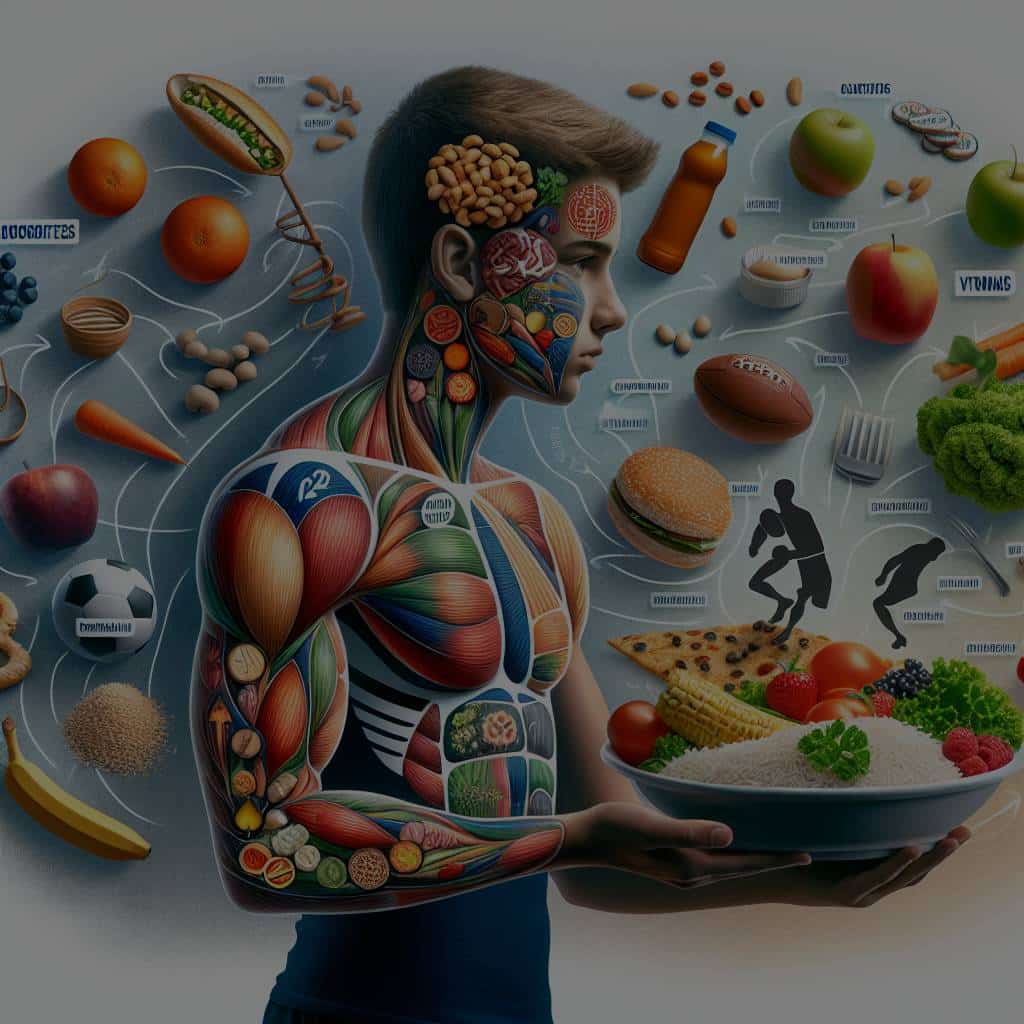What Nutritional Considerations Are Essential for Adolescent Athletes?

In the complex world of sports, aspiring athletes, especially the young and adolescent ones, face numerous challenges. From rigorous training to balancing academics and athletics, these young athletes have a lot on their plate. However, one key aspect often overlooked by many is nutrition. Proper nutrition is of paramount importance, particularly for athletes. It provides the necessary energy and nutrients required to maintain their performance, enhance recovery, and prevent injuries.
Let’s delve into the critical nutritional considerations for adolescent athletes and understand how a balanced diet can substantially enhance their performance in sports.
Lire également : How Can Intermittent Fasting Protocols Influence Longevity and Age-Related Diseases?
Understanding the Importance of Protein for Athletes
Protein plays an integral role in an athlete’s diet. It assists in muscle growth, repair, and recovery post-exercise. The body requires a higher protein intake during the adolescent phase due to rapid growth and development.
For adolescent athletes, the recommended protein intake varies based on the frequency and intensity of the sport. As a general guideline, Google Scholar suggests that the protein intake for young athletes should be approximately 1.2 to 2.0 grams per kilogram of body weight per day. This can be achieved by incorporating lean meats, dairy products, eggs, and plant-based proteins like lentils and beans into their diet.
Lire également : What Are the Effects of Blue Space (Water Bodies) Exposure on Mental Health and Well-being?
However, it’s essential to note that protein intake should be balanced with the consumption of other nutrients. Simply consuming large amounts of protein will not benefit an athlete if their overall diet and macronutrient balance is not adequate.
Carbohydrates: The Primary Energy Source for Youth Athletes
Carbohydrates are the main source of energy for athletes. Without adequate carbohydrate intake, an athlete’s performance can significantly be hampered. Carbohydrates are converted into glucose in the body, which fuels the muscles during exercise. This makes it essential for athletes to maintain adequate carbohydrate intake, especially before and after training sessions.
According to sports nutrition guidelines, adolescent athletes should aim to get around 50-60% of their daily calories from carbohydrates. Consuming complex carbohydrates such as whole grains, fruits, and vegetables ensures a steady supply of energy to the body, reducing the likelihood of fatigue during performance.
The Role of Fats in Athlete’s Performance
Often, fats are misunderstood and wrongly associated only with weight gain and health risks. In reality, fats serve as an important energy source, especially during prolonged exercise. They also play a crucial role in hormone production and absorption of fat-soluble vitamins.
Adolescent athletes should aim for approximately 20-35% of their daily caloric intake from fats. The focus should be on consuming healthy fats found in foods like avocados, nuts, seeds, and fatty fish. It’s essential to limit the intake of saturated and trans fats, which are often found in processed foods and can lead to health problems if consumed in excess.
Importance of Iron and Other Micronutrients in an Athlete’s Diet
Iron is critical for athletes as it helps in carrying oxygen to the muscles, a crucial process during exercise. Iron deficiency can lead to fatigue and decreased athletic performance. Adolescent athletes, especially girls, are at a higher risk of iron deficiency due to rapid growth and menstrual losses. Thus, incorporating iron-rich foods like lean meats, seafood, beans, and fortified cereals in their diet is crucial.
In addition to iron, other micronutrients like calcium, vitamin D, and B-vitamins also play a significant role in an athlete’s health and performance. These nutrients help in bone health, energy production, and recovery process, necessitating their adequate intake in an athlete’s diet.
Hydration: An Unmissable Aspect of Sports Nutrition
While focusing on macronutrients and micronutrients, hydration is one aspect of sports nutrition that should not be overlooked. Adequate hydration is essential for maintaining performance and preventing heat-related illnesses during exercise. Adolescent athletes are particularly at risk for dehydration due to their higher sweat rates and lower ability to dissipate heat.
The American Academy of Pediatrics suggests that children and adolescents should consume 6-8 ounces of water every 20 minutes during exercise. Additionally, sports drinks containing electrolytes and carbohydrates can be beneficial during prolonged exercise to replenish the lost electrolytes and provide a quick source of energy.
From protein to hydration, each aspect of nutrition has a unique role in an athlete’s life. However, the needs may vary depending on the sport, intensity of training, and individual factors. Thus, it is recommended to seek guidance from a sports nutrition professional to design a tailored nutrition plan. This will ensure that adolescent athletes consume a balanced diet that adequately meets their nutritional requirements and supports their athletic performance.
The Influence of Fish Oil and Omega-3 Fatty Acids on Young Athletes
Fish oil, rich in omega-3 fatty acids, holds immense importance in the diet of a young athlete. This is attributed to the inherent anti-inflammatory properties of omega-3 fatty acids, which aid in reducing inflammation caused by strenuous physical activity. As per an article on Pubmed Google, fish oil also plays a crucial role in lipid metabolism and cardiovascular health, both of which are crucial for adolescent athletes.
Incorporating fish oil into the diet of a youth athlete can help in reducing muscle soreness and improve recovery rates after intense training. Furthermore, omega-3 fatty acids have shown to enhance lung function during exercise, thereby potentially improving athletic performance.
For an adolescent athlete, the American Heart Association recommends eating at least two servings of fatty fish, such as salmon or mackerel, per week. However, it’s important to remember that while fish oil can benefit an athlete’s performance and recovery, it should not replace a balanced diet or regular exercise but should be a part of a comprehensive nutritional plan.
The Intersection of Growth and Development with Nutritional Needs
The adolescent phase is characterized by rapid growth and development, resulting in increased nutritional needs. During this critical period, adequate protein intake is necessary to support growth development, while carbohydrate ingestion is essential for maintaining energy levels. Furthermore, micronutrients like iron, calcium, and vitamin D are vital for the development of bones and red blood cells.
According to Google Scholar, inadequate nutrition during adolescence can lead to delayed puberty, hindered growth, and even affect athletic performance. Moreover, poor nutrition can increase the risk of injuries and prolong recovery time. Hence, adolescent athletes should pay close attention to their diet to ensure they are meeting their increased nutritional needs.
Research suggests that adolescent athletes require a higher energy intake compared to their non-athletic peers due to the extra energy expended during training. As such, the diet of a young athlete should be well-balanced, comprising appropriate proportions of proteins, carbs, fats, and micronutrients, and customized according to the athlete’s body weight, age, gender, and the type of sport they engage in.
Conclusion: The Key to Optimizing Athletic Performance
In conclusion, nutrition is a fundamental component of an athlete’s life, affecting not only their athletic performance but also their overall health. The importance of a balanced diet, adequate hydration, and appropriate supplementation cannot be overstated for adolescent athletes.
Adolescence is marked by rapid growth and development, which, coupled with the physical demands of sports, necessitates a higher energy intake. A well-planned nutrition strategy, including the right mix of macronutrients and micronutrients, becomes crucial to fuel the body’s growth and the increased energy demands of athletic training.
As each individual’s needs vary, a one-size-fits-all approach might not work for all athletes. Therefore, adolescent athletes, along with their coaches and parents, should consider seeking advice from sports nutrition professionals. With personalized guidance, young athletes can design a dietary plan that meets their unique needs, supports growth, enhances performance, and promotes long-term health.
This comprehensive approach to sports nutrition will ensure that adolescent athletes are adequately fueled to reach their maximum potential and achieve their athletic goals. Remember, good nutrition is the fuel that drives an athlete’s performance on and off the field.
